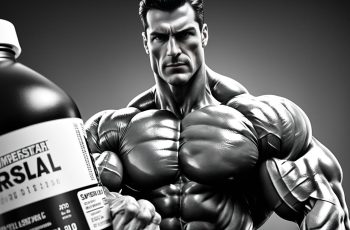Ad Blocker Detected
Our website is made possible by displaying online advertisements to our visitors. Please consider supporting us by disabling your ad blocker.
Hey there! Are you looking to boost your testosterone levels naturally? Well, the good news is, it’s totally possible! In this article, we’ll explore some effective strategies that can help men regain their testosterone levels without relying on artificial methods or medications. So, if you’re ready to re-energize your body and enhance your overall well-being, stay tuned!

This image is property of images.pexels.com.
Factors that can affect testosterone levels
Age
Testosterone levels naturally decline as men age. After the age of 30, testosterone production gradually decreases at a rate of about 1-2% per year. This age-related decline in testosterone, known as andropause, can lead to various symptoms such as low energy, decreased libido, and reduced muscle mass. However, it is important to note that testosterone levels can vary greatly among individuals, and not all men will experience significant declines in their testosterone levels with age.
Lifestyle choices
Certain lifestyle choices can have an impact on testosterone levels. Smoking cigarettes, excessive alcohol consumption, and recreational drug use have been associated with lower testosterone levels. On the other hand, engaging in regular exercise, maintaining a healthy weight, and managing stress levels can help optimize testosterone production.
Nutrition and diet
The foods you eat can also influence testosterone levels. Consuming a balanced diet that includes an adequate amount of protein, healthy fats, and a variety of fruits and vegetables can support testosterone production. Certain nutrients like zinc, vitamin D, and magnesium have been found to play a crucial role in testosterone synthesis.
Physical activity and exercise
Regular exercise is not only important for overall health but can also help increase testosterone levels. Both cardiovascular exercise and strength training have shown to be effective in promoting testosterone production. Engaging in weightlifting or resistance training exercises can have a particularly positive impact on testosterone levels.
Stress levels
Stress is known to have a negative impact on hormone balance, including testosterone production. Chronic stress can lead to high levels of cortisol, a stress hormone that can inhibit testosterone synthesis. Finding ways to manage and reduce stress, such as practicing relaxation techniques or engaging in hobbies, can help optimize testosterone levels.
Sleep quality
Adequate sleep is essential for maintaining optimal hormone levels, including testosterone. Research has shown that lack of sleep or poor sleep quality can significantly reduce testosterone levels. Aim for 7-9 hours of uninterrupted sleep per night and establish a consistent sleep routine to support testosterone production.
Body weight and fat distribution
Excess body weight, particularly abdominal fat, has been associated with lower testosterone levels. Adipose tissue, or fat cells, can convert testosterone to estrogen, a process known as aromatization. This can lead to an imbalance of hormones and lower testosterone levels. Maintaining a healthy weight through a balanced diet and regular exercise can help support testosterone production.
Certain medications and medical conditions
Certain medications, such as opiate painkillers and corticosteroids, can suppress testosterone production. Additionally, certain medical conditions like hypogonadism, diabetes, and obesity can also contribute to low testosterone levels. It is important to be aware of the potential effects of medications and address underlying medical conditions that may be impacting testosterone levels.
Environmental factors
Environmental factors, such as exposure to endocrine-disrupting chemicals (EDCs), can also influence testosterone levels. EDCs are found in various products and substances, including plastics, pesticides, and personal care products. Minimizing exposure to these chemicals and opting for natural and organic alternatives can help maintain optimal testosterone levels.
Genetics
Genetics also play a role in determining testosterone levels. Some individuals may naturally have higher or lower testosterone production due to their genetic makeup. However, it is important to remember that lifestyle factors and environmental influences can still have a significant impact on testosterone levels, even for individuals with a genetic predisposition.
Natural ways to boost testosterone
Optimize diet
A well-balanced diet that includes a variety of nutrient-rich foods can support testosterone production. Consuming adequate protein from sources like lean meats, fish, eggs, and legumes provides the building blocks for testosterone synthesis. Healthy fats, such as those found in avocados, nuts, and olive oil, are also important for hormone production. Additionally, including foods rich in zinc, vitamin D, and magnesium, such as oysters, fatty fish, fortified dairy products, and leafy greens, can support testosterone levels.
Engage in regular exercise
Regular physical activity, including both cardiovascular exercise and strength training, can help boost testosterone levels. High-intensity interval training (HIIT) and weightlifting exercises have been found to be particularly effective in promoting testosterone production. Aim for a mix of aerobic and resistance exercises to optimize hormone levels.
Maintain a healthy weight
Excess body fat, especially around the abdomen, has been associated with lower testosterone levels. Maintaining a healthy weight through a combination of balanced nutrition and regular exercise can help support optimal testosterone production. Incorporate both aerobic exercise and strength training into your fitness routine to promote fat loss and maintain muscle mass.
Get enough sleep
Prioritizing quality sleep is crucial for testosterone production. Aim for 7-9 hours of uninterrupted sleep each night to support optimal hormone levels. Create a sleep-friendly environment by keeping your bedroom cool, dark, and quiet, and establish a regular sleep routine. Avoid electronic devices before bed, as the blue light emitted can disrupt sleep patterns.
Minimize stress
Chronic stress can negatively affect testosterone levels. Find healthy ways to manage and reduce stress, such as practicing relaxation techniques, engaging in hobbies, or seeking support from friends or professionals. Meditation, deep breathing exercises, and mindfulness practices can all help regulate stress and support testosterone production.
Limit exposure to environmental toxins
Endocrine-disrupting chemicals (EDCs) found in everyday products can interfere with hormone balance, including testosterone production. Reduce exposure to EDCs by choosing natural and organic personal care products, avoiding plastic food containers and water bottles, and opting for organic fruits and vegetables. This can help maintain optimal testosterone levels and overall health.
Consider natural supplements
Certain natural supplements have been found to potentially support testosterone levels. These include herbs like ashwagandha and tribulus terrestris, which have been traditionally used to enhance male vitality and hormone balance. However, it is important to consult with a healthcare professional before starting any supplement regimen to ensure safety and effectiveness.
Increase vitamin D intake
Vitamin D deficiency has been linked to low testosterone levels. Increase your intake of vitamin D by spending time outdoors in sunlight, consuming fortified dairy products and fatty fish, or considering a vitamin D supplement. Aim for a blood level of vitamin D between 50-70 ng/mL for optimal testosterone production.
Ensure adequate zinc consumption
Zinc is an essential mineral for testosterone synthesis. Include zinc-rich foods in your diet, such as oysters, beef, pumpkin seeds, and spinach. If needed, consult with a healthcare professional to determine if a zinc supplement is necessary to support optimal testosterone levels.
Manage medication and medical conditions
Certain medications, such as opioids and corticosteroids, can suppress testosterone production. If you are taking these medications, discuss with your healthcare provider alternative options or strategies to mitigate their impact on testosterone levels. It is also important to address underlying medical conditions, such as hypogonadism or diabetes, that may be contributing to low testosterone levels.

This image is property of images.pexels.com.
Dietary considerations for increasing testosterone levels
Consume adequate protein
Protein is essential for testosterone synthesis and overall hormone balance. Include sources of lean protein in your diet, such as chicken, turkey, fish, eggs, and legumes. Aim to consume about 0.8-1 gram of protein per pound of body weight to support optimal testosterone levels.
Include healthy fats
Healthy fats play a crucial role in hormone production, including testosterone. Incorporate sources of healthy fats into your diet, such as avocados, nuts, seeds, olive oil, and fatty fish like salmon or mackerel. These fats provide the necessary building blocks for testosterone synthesis.
Avoid excessive alcohol consumption
Excessive alcohol consumption can have a negative impact on testosterone levels. Alcohol can disrupt hormone balance and interfere with testosterone production. Limit your alcohol intake or consider abstaining altogether to support optimal testosterone levels.
Limit processed and sugary foods
Processed and sugary foods can contribute to weight gain and insulin resistance, both of which can negatively affect testosterone levels. Avoid or limit foods high in refined sugars, refined grains, and unhealthy fats. Instead, opt for whole, unprocessed foods that are rich in nutrients.
Eat foods rich in specific nutrients like zinc, vitamin D, and magnesium
Certain nutrients are important for testosterone production. Include foods that are rich in zinc, such as oysters, beef, pumpkin seeds, and spinach. Get enough vitamin D from sources like fortified dairy products, fatty fish, and sunlight exposure. Incorporate magnesium-rich foods into your diet, such as dark chocolate, almonds, spinach, and legumes.
Consider intermittent fasting
Intermittent fasting, which involves limiting the time window for eating, has been shown to have potential benefits for testosterone levels. It may help optimize hormone production and improve insulin sensitivity. However, it is important to consult with a healthcare professional before starting any fasting protocol to ensure it is suitable for your individual needs.
Include testosterone-boosting superfoods in the diet
Certain foods have been associated with potential testosterone-boosting properties. These include foods like pomegranates, ginger, garlic, cruciferous vegetables (broccoli, cauliflower, kale), and Brazil nuts. While these foods may have some beneficial effects, it is important to incorporate them as part of a well-rounded and balanced diet.
Stay hydrated
Proper hydration is important for overall health, including hormone balance. Make sure to drink an adequate amount of water throughout the day to support optimal testosterone production. Aim for at least 8 cups (64 ounces) of water per day, or more if you are physically active or in a hot environment.
Benefits of regular exercise for testosterone levels
Increase testosterone production
Engaging in regular exercise, particularly strength training exercises, can help increase testosterone production. Resistance training stimulates the release of testosterone, promoting muscle growth and overall hormone balance. Aim for a combination of both aerobic and strength training exercises to optimize testosterone levels.
Promote muscle growth and fat loss
Regular exercise, especially strength training, promotes muscle growth and fat loss. Building lean muscle mass can have a positive impact on testosterone levels, as muscle cells produce more testosterone compared to fat cells. Additionally, reducing excess body fat, particularly around the abdomen, can help optimize testosterone production.
Enhance insulin sensitivity
Regular exercise improves insulin sensitivity, allowing cells to effectively utilize glucose for energy. Insulin resistance, a condition where cells become less responsive to insulin, can negatively affect testosterone levels. By improving insulin sensitivity, exercise supports optimal hormone production and overall metabolic health.
Improve mood and reduce stress
Exercise has been shown to have positive effects on mood and mental well-being. Physical activity stimulates the release of endorphins, which are known as “feel-good” hormones. Additionally, regular exercise can help reduce stress levels and improve overall stress management, contributing to optimal testosterone production.
Combat age-related testosterone decline
Regular exercise can help combat the age-related decline in testosterone levels. By engaging in both cardiovascular exercise and strength training, older adults can support optimal hormone balance and potentially mitigate the effects of andropause. It is never too late to start exercising and reaping the benefits for testosterone levels and overall health.
Improve overall health and well-being
Regular exercise has numerous benefits beyond testosterone optimization. It supports cardiovascular health, improves bone density, enhances cognitive function, and boosts energy levels. By prioritizing regular physical activity, you not only support optimal testosterone production but also improve your overall health and well-being.

This image is property of images.pexels.com.
The importance of maintaining a healthy weight
Excess body fat and testosterone levels
Excess body fat, especially visceral fat around the abdomen, has been associated with lower testosterone levels. Adipose tissue contains an enzyme called aromatase, which converts testosterone to estrogen. When estrogen levels become elevated due to excess body fat, it can disrupt the hormonal balance and lead to lower testosterone levels.
The role of testosterone in fat metabolism
Testosterone plays a role in fat metabolism, particularly in men. It helps regulate lipid metabolism and promotes the breakdown and utilization of fat for energy. When testosterone levels are low, the body may have difficulty effectively using stored fat as an energy source, leading to weight gain and further hormone imbalances.
Effects of weight loss on testosterone levels
Losing excess body weight can have a positive impact on testosterone levels. Research has shown that even modest weight loss, around 5-10% of total body weight, can lead to significant increases in testosterone production. Weight loss achieved through a combination of balanced nutrition and regular exercise supports optimal hormone balance.
Balancing caloric intake and energy expenditure
Maintaining a healthy weight requires a balance between caloric intake and energy expenditure. Consuming a diet that is slightly below your daily caloric needs can help promote weight loss. However, it is important to ensure that the diet is still providing all the necessary nutrients for hormone production, as extreme caloric restrictions can negatively affect testosterone levels.
Choosing a sustainable weight loss approach
When aiming to lose weight, it is important to choose a sustainable approach that can be maintained long-term. Crash diets or extreme exercise routines can place stress on the body, potentially leading to hormone imbalances and decreased testosterone production. Focus on making gradual, sustainable changes to your diet and exercise habits for long-term success.
The impact of sleep on testosterone production
Understanding the sleep-testosterone relationship
Sleep plays a crucial role in testosterone production and overall hormone balance. Testosterone levels follow a natural circadian rhythm, with the highest levels occurring in the morning upon waking. During sleep, the body goes through various stages, including deep sleep, which is when the majority of testosterone secretion occurs.
Sleep quality vs. quantity
Both sleep quality and quantity are important for optimal testosterone production. While a sufficient amount of sleep is necessary, the quality of sleep is equally important. Disruptions in sleep, such as waking up frequently during the night or having poor sleep quality, can negatively impact testosterone levels. Aim for both adequate sleep duration and good sleep quality to support optimal hormone balance.
The role of deep sleep in testosterone secretion
Deep sleep, also known as slow-wave sleep or NREM (non-rapid eye movement) sleep, is a critical stage for testosterone production. During this stage, the pituitary gland releases pulses of luteinizing hormone (LH), which stimulates the testes to produce testosterone. Disruptions in deep sleep can hinder this process and result in suboptimal testosterone levels.
Tips for improving sleep hygiene
Establishing good sleep hygiene practices can help improve sleep quality and support optimal testosterone production. Create a sleep-friendly environment by keeping your bedroom cool, dark, and quiet. Avoid electronic devices before bed, as the blue light emitted can interfere with melatonin production. Stick to a consistent sleep schedule and engage in relaxing activities before bed, such as reading or taking a warm bath.
Addressing sleep disorders and disturbances
If you experience persistent sleep disturbances or suspect you have a sleep disorder, it is important to seek medical evaluation and treatment. Conditions such as sleep apnea, insomnia, or restless leg syndrome can significantly impact sleep quality and hormone balance. Treating these underlying conditions can help support optimal testosterone production.
Managing stress to optimize testosterone levels
Stress and its effects on hormone balance
Chronic stress can disrupt hormone balance, including testosterone production. When the body is under prolonged stress, the adrenal glands release cortisol, a stress hormone that can inhibit testosterone synthesis. Elevated cortisol levels can lead to imbalances in the hypothalamic-pituitary-gonadal axis, which regulates testosterone production.
Stress reduction techniques
Finding effective stress reduction techniques can help optimize testosterone levels. Engaging in activities that promote relaxation and stress relief can have a positive impact on hormone balance. Examples of stress reduction techniques include deep breathing exercises, meditation, yoga, or engaging in hobbies and activities that bring joy and relaxation.
Psychological interventions for stress management
For individuals experiencing significant stress or its effects on hormone balance, seeking psychological interventions can be beneficial. Therapies like cognitive-behavioral therapy (CBT) or mindfulness-based stress reduction (MBSR) can help individuals manage stress, improve coping mechanisms, and support optimal testosterone levels.
Incorporating relaxation practices into daily routine
Making time for relaxation practices in your daily routine can help manage and reduce stress levels. This can include activities like taking breaks throughout the day to stretch or take deep breaths, practicing mindfulness or meditation, engaging in hobbies or creative outlets, or spending time in nature. Regularly incorporating these practices can have a cumulative effect on stress reduction and hormone balance.
Prioritizing self-care
Self-care plays a crucial role in managing stress and optimizing testosterone levels. Prioritize activities that support your physical, mental, and emotional well-being. This can include getting regular exercise, practicing good sleep habits, eating a balanced diet, engaging in hobbies, spending time with loved ones, and seeking support when needed. Taking care of yourself is essential for maintaining optimal hormone balance.
Identifying environmental factors that can impact testosterone
Endocrine-disrupting chemicals and testosterone
Endocrine-disrupting chemicals (EDCs) are substances that interfere with hormone regulation in the body. Exposure to EDCs can disrupt testosterone production and lead to imbalances in hormone levels. Common sources of EDCs include certain plastics, pesticides, herbicides, heavy metals, and some personal care products.
Common sources of exposure to harmful chemicals
EDCs can be found in everyday products, making exposure difficult to avoid completely. Common sources of exposure to harmful chemicals include plastic food and drink containers, non-stick cookware, cosmetics, cleaning products, and pesticides. It is important to be aware of these potential sources and take steps to minimize exposure.
Reducing exposure to environmental toxins
While it may be challenging to completely eliminate exposure to EDCs, there are steps you can take to reduce your exposure and support optimal testosterone levels. Choose natural and organic personal care products that are free from harmful chemicals. Opt for glass or stainless steel food containers and avoid using plastic containers for hot foods or liquids. Use natural cleaning products and choose organic produce whenever possible.
Choosing natural and organic personal care products
Many personal care products contain chemicals that can disrupt hormone balance. Opt for natural and organic alternatives that are free from ingredients like parabens, phthalates, and synthetic fragrances. Look for products that are labeled as “EDC-free” or “hormone-friendly” to minimize the risk of exposure to harmful chemicals.
Considering household and lifestyle changes
In addition to choosing natural and organic products, making certain household and lifestyle changes can also reduce exposure to harmful chemicals. Avoid using pesticides or herbicides in your home or garden. Filter your drinking water to remove potential contaminants. Opt for fresh, whole foods instead of processed or packaged options. These small changes can add up and contribute to a healthier, hormone-friendly environment.
Supplement options for testosterone optimization
Herbal supplements that may boost testosterone
There are various herbal supplements that have been traditionally used to support testosterone levels. These include herbs like ashwagandha, tribulus terrestris, fenugreek, and tongkat ali. While some studies suggest potential benefits, the effectiveness of these supplements may vary among individuals. It is important to consult with a healthcare professional before starting any supplement regimen to ensure safety and effectiveness.
Vitamin and mineral supplements for testosterone support
Certain vitamins and minerals have been implicated in testosterone production. These include zinc, vitamin D, magnesium, and vitamin B6. If you are deficient in any of these nutrients, a healthcare professional may recommend supplementation to support optimal testosterone levels. However, it is important to have your nutrient levels assessed before starting any supplementation.
Omega-3 fatty acids and their impact on testosterone
Omega-3 fatty acids, found in fatty fish, walnuts, flaxseeds, and chia seeds, have been associated with potential benefits for testosterone levels. These healthy fats support overall hormone balance and have anti-inflammatory properties. Including omega-3 rich foods in your diet or considering a fish oil supplement may help support testosterone production.
The role of ashwagandha in testosterone production
Ashwagandha, an herb used in traditional Ayurvedic medicine, has shown promise as a natural testosterone-booster. Studies have suggested that ashwagandha supplementation may help increase testosterone levels, improve semen quality, and enhance overall reproductive health. However, further research is needed to fully understand its effects, and it is important to consult with a healthcare professional before starting any new supplement.
Consulting a healthcare professional before starting supplements
While certain supplements may show potential benefits for testosterone optimization, it is important to consult with a healthcare professional before starting any new supplement regimen. They can assess your individual health status, evaluate potential interactions with medications or medical conditions, and recommend appropriate supplements based on your specific needs.
Can Natural Methods Help Men Regain Testosterone Levels?
Yes, there are natural ways to boost testosterone levels in men. Regular exercise, healthy diet, adequate sleep, reduced stress, and certain herbal supplements like ashwagandha and fenugreek have shown promising results in promoting the production of testosterone in the body.
Understanding the role of vitamin D in testosterone levels
The connection between vitamin D and testosterone
Vitamin D is a fat-soluble vitamin that plays a crucial role in overall health and well-being, including testosterone production. Research has found a positive association between vitamin D levels and testosterone levels. Low vitamin D levels have been linked to decreased testosterone production, while optimizing vitamin D levels can help support optimal hormone balance.
Effect of vitamin D deficiency on testosterone
Vitamin D deficiency is associated with lower testosterone levels. In one study, men with vitamin D deficiency had significantly lower testosterone levels compared to those with optimal vitamin D levels. Vitamin D deficiency can disrupt the production of luteinizing hormone (LH), which stimulates the testes to produce testosterone. Ensuring adequate vitamin D levels is important for maintaining optimal testosterone production.
Sources of vitamin D
The primary source of vitamin D is sunlight exposure. When ultraviolet B (UVB) rays from the sun come into contact with the skin, vitamin D synthesis is triggered. Dietary sources of vitamin D include fatty fish (such as salmon, mackerel, and sardines), fortified dairy products, egg yolks, and certain mushrooms. However, it can be challenging to obtain sufficient vitamin D from food alone, especially in regions with limited sunlight exposure.
Optimal vitamin D levels for testosterone production
Optimal vitamin D levels for testosterone production are still a topic of debate among healthcare professionals. However, it is generally recommended to aim for a blood level of vitamin D between 50-70 ng/mL for overall health and well-being. Maintaining adequate vitamin D levels can support optimal testosterone production and overall hormone balance.
Supplementation guidelines
If you are unable to obtain sufficient vitamin D from sunlight and dietary sources, supplementation may be necessary. It is important to have your vitamin D levels assessed through a blood test before starting supplementation. This will help determine the appropriate dosage and duration of supplementation required to reach and maintain optimal vitamin D levels. Work with a healthcare professional to establish a supplementation regimen that is tailored to your individual needs.



